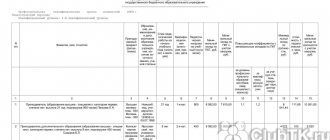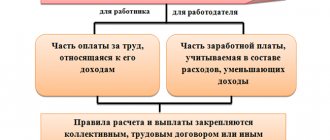In 2021, Federal Law No. 272-FZ dated June 3, 2016 was adopted. This regulatory act regulates the timing of salary payments in 2021. Let us remind you that the changes came into force on October 3, 2016 and are valid to this day. Changes have been made to the current legislation, according to which salaries cannot be issued later than the 15th day of the month following the payroll month. The following important changes should also be highlighted:
- increasing the degree of financial responsibility of the employer to the employee;
- fines for violations of labor laws have been increased;
- the amount of monetary compensation to an employee for failure to meet salary payment deadlines has been increased.
In our material today we will talk about how to properly bring labor relations with employees in accordance with the changed legislation.
Deadlines for salary payments in 2021 according to the Labor Code of the Russian Federation
Changes to the Labor Code of the Russian Federation in the timing of salary payments in 2021 affected Art. 136 of the Labor Code, which determines the terms of payment of wages in Russia. Until now, this article has not established specific dates for the payment of salaries. The only obligation that this article placed on the employer was to pay wages at least once every half month.
The timing of salary payments in 2021 is strictly regulated. In accordance with Art. 136 of the Labor Code of the Russian Federation, as before, wages will have to be paid at least once every two weeks. At the same time, the article now contains a clarification that the payment of salaries should occur no later than the 15th of the next month.
Specific terms for payment of wages in 2021 must be specified in labor and collective agreements and internal labor regulations.
It must be said that according to statistics, most employers already issue salaries before the 15th of the next month. However, the local regulations of the enterprise (IP) and contracts listed above may not contain these conditions. Therefore, if necessary, employers should make appropriate changes to them.
Terms of payment of salary upon dismissal
In Art. 140 of the Labor Code of the Russian Federation states that the deadline for calculating wages in 2019 upon dismissal is the last day of work.
For your information
If the worker did not work on the day of dismissal, then the date of payment of the salary is considered to be the day that follows the day the worker’s request for payment was received.
Late payment of salary upon dismissal is punishable for the employer.
In Art. 236 of the Labor Code of the Russian Federation establishes the obligation of the company, in case of late wages, to pay the worker a compensation payment, which is equal to 1/300 of the current discount rate of the Central Bank of the Russian Federation (today the discount rate is 8.5%) for each delay.
Salary and advance
In accordance with the law, the break between the issuance of an advance and a salary should be no more than fifteen days.
For example, if an organization or individual entrepreneur gives employees an advance on the 20th, then the salary should be issued no later than the 5th of the next month. If the advance is issued on the 30th, then the salary is paid no later than the 15th. Violation of labor legislation by enterprises in this part, in accordance with Art. 5.27 of the Code of Administrative Offenses of the Russian Federation, entails a fine of up to 50,000 rubles.
At the same time, issuing wages earlier than the deadline established by local regulations is not a violation.
Payment methods
Today, the legislation defines only 3 ways of issuing wages to a person. These include:
- transfer of funds to his personal account
- issuing the required amount from the organization's cash desk in cash
- natural form
The first two methods represent the equivalent in rubles, and before issuance, the employee is notified by the accountant about upcoming payments; this procedure takes place using a pay slip.
It contains information about:
- parts that make up wages for a certain period of time based on days worked
- funds withheld as a result of taxation, other costs (writs of execution, fines, etc.)
- the total amount calculated for payment
Most employers prefer the first option of transferring salaries to the recipient’s personal account, since it is convenient, does not require the constant availability of amounts for employee salaries in the cash register, time and effort are not spent on issuing money, the person receives it through the bank. Organizations enter into agreements with credit institutions, after which they interact to transfer the necessary funds.
The boss does not have the right to independently establish the method of payment; this point is agreed upon with the employee and reflected in the employment contract. If a citizen does not agree, he can fill out an application with a request to transfer his salary in cash from the cash register, if he is satisfied with this option.
According to the Central Bank decree number 373-p, in force since October 12, 2011, enterprises can pay wages from the cash register in cash. This document also regulates the mechanism for recording transactions and maintaining documentation. In any case, the company enters into an agreement with the bank, which transfers the necessary amounts in accordance with the intended purpose. Cash funds are not allocated for other areas of activity. If the organization has a stable income, it can pay the advance and the balance from these resources, in agreement with the bank.
The in-kind form of remuneration is regulated by the ILO Convention in force on Russian territory, number 95. It states that the full amount of wages is not issued in the form of products, its share is no more than 20% of the total amount. The in-kind form refers to goods obtained as a result of production in the organization. For example, agricultural machinery that a worker needs to satisfy his needs or earn additional money, which gives him the opportunity to provide himself and his family with everything necessary. This method of remuneration is feasible under the following conditions:
- the employee independently formed his position and filled out an application with a request to pay him part of his salary in exactly this way
- this possibility is specified in the collective agreement of the institution
There are exceptions in the form of goods that cannot be used to pay for an employee’s work. These include:
- alcohol-containing products
- narcotic substances
- poisonous, toxic and chemical solutions
- ammunition and weapons
Attention! The goods transferred to the specialist must meet high quality characteristics, meet all GOST requirements and average market prices that are relevant for such types of products in the area where citizens live.
Checking employment contracts
The situation is similar with labor and collective agreements. They should reflect the timing of salary payments in 2021. It is possible that their content already fully complies with the requirements of the new law. But it is possible that the contract allows for payment of wages later than the 15th of the next month, for example, the 20th. It may also turn out that the gap between the payment of the advance and the payment of wages is more than 15 days.
According to the changes in legislation being considered, these are violations.
Notifying employees about changes
To make appropriate changes to the employment contract, it is necessary to send the employee a written notice of changes to the terms of the employment contract. The notice must list the changes to the contract, indicating specific reasons and grounds. In this case, the notification must contain new deadlines for payment of wages according to the Labor Code of the Russian Federation.
Moreover, in accordance with Part 2 of Art. 74 of the Labor Code of the Russian Federation, notification must be sent to the employee no later than two months before the changes are made.
Additional agreement to the contract
In addition to editing the contract itself, it is necessary to conclude an additional document. agreement, which will also fix new terms for payment of wages.
Making changes to the contract and concluding a new additional agreement to it is enough to change the terms of payment of wages. There is no need to issue an order to postpone the payment of wages.
How to make changes to documents and set the correct deadlines for paying wages
If for some reason you do not have LNA regulating the timing of salary transfers, they need to be done as quickly as possible. If the necessary LNAs exist, but the dates in them are indicated incorrectly, this should be promptly corrected:
- If possible, redo the document, but only if doing so will not cause inconsistencies with your other documentation.
- In order to change the collective agreement, assemble a commission of representatives of both parties - employees and employer. Document the results of the negotiations between the commission members in an additional agreement, in which you indicate the new salary terms.
- If salary dates were included in employment contracts, you will have to draw up additional agreements for each of them.
- Changes in the terms of payment of wages included in the PVTR are the easiest to formalize - to do this, it is enough to issue an order, which should be familiarized to each employee against signature.
You can see what such an order looks like here:
Financial liability for violation of deadlines
According to current legislation, failure to pay wages on time entails financial liability for the employer. The corresponding provision is contained in Art. 236 Labor Code of the Russian Federation. In accordance with the new law, financial liability will be increased.
Increase in compensation amounts
Let us remind you that the amount of compensation for delayed wages is calculated as a percentage of the amounts not paid to the employee on time. From October 3, 2021, the amount of compensation has been increased.
Until October 3, 2016, compensation was 1/300 of the Bank of Russia refinancing rate for each day of delay. From October 3, 2016, it is 1/150 of the Bank of Russia refinancing rate for each day of delay. In 2021, the refinancing rate is 7.75%.
Increase in administrative fines
Administrative fines for late wages have also changed since October 3, 2016; their values are current for 2021 . Their amounts, together with the amounts of fines in force before the new law came into force, are shown in the following table:
| Responsible person | Fines until 03.10.2016 | Fines effective in 2021 |
| Head of the enterprise | 1000–5000 rub. or warning | 10,000–20,000 rub. or warning |
| IP | 1000–5000 rub. | 1000–5000 rub. |
| Entity | 30,000–50,000 rub. | 30,000–50,000 rub. |
| Repeated delay in payment | ||
| Head of the enterprise | 10,000–20,000 rub. or disqualification for 1-3 years | 20,000–30,000 rub. or disqualification for 1-3 years |
| IP | 10,000–20,000 rub. | 10,000–30,000 rub. |
| Entity | 50,000–70,000 rub. | 50,000–100,000 rub. |
It is also necessary to remember that the employer may be held administratively liable if the wages of employees are set at a level below the minimum wage. Let us remind you that in 2021 the minimum wage, in accordance with federal legislation, was 11,280 rubles. The minimum wage in 2021 has been increased and is 12,130 rubles . However, the size of the minimum wage in individual regions may differ from this figure.
Underwater rocks
Payments are made 2 times a month.
In addition, we should separately consider violations of the terms of payment of wages for a certain category of employees - newly hired ones. Thus, even if an employee was hired on the 13th, then on the 15th he is obliged to receive a salary for the time actually worked.
If payment for his work is made only in advance, that is, at the end of the month, then this state of affairs is also considered a violation of the law and is punishable by the fine mentioned above.
In addition, officials who did not pay wages on time (accountants involved in payroll projects) may also be held accountable. For them, the fine ranges from 10 to 20 thousand rubles, depending on the degree of guilt and the total period of delay.
In case of repeated gross violation of the rules and terms of salary payment, not only a twofold increase in the amount of fines is provided, but also the possibility of removal from their position for a period of 1 to 5 years for individuals.
An organization may have different dates for paying salaries to employees in different departments.
For example, one department may receive salaries on the 13th, another on the 14th, and a third on the 15th. The law does not prohibit this.
This might also be useful:
- Sick leave for pregnancy and childbirth
- Personal income tax withholding from wages and its return
- Compensation for staff reduction
- Daily travel expenses in 2021
- Do you need an accountant for an individual entrepreneur?
- Procedure for paying sick leave in 2021
Is the information useful? Tell your friends and colleagues
Dear readers! The materials on the TBis.ru website are devoted to typical ways to resolve tax and legal issues, but each case is unique.
If you want to find out how to solve your specific issue, please contact the online consultant form. It's fast and free!
If the salary payment day falls on a weekend
In accordance with the Labor Code of the Russian Federation, salaries must be calculated at least every 15 days on the day specified in the company’s labor regulations and in the contract.
As a result, the day of accrual of the advance (for the first 15 days of the month) and the date of calculation must be specified in the agreement between the director of the company and the worker.
If this day is Saturday, Sunday or the day of any holiday in the Russian Federation, the salary payment must be made before this day (Part 8 of Article 136 of the Labor Code of the Russian Federation).
For your information
So, the day of payment for salary in a company is the 5th day of the month following the reporting month. In such a situation, the salary for October 2021 should be issued to the employee on Friday, October 4, 2021. After all, October 5, 2019 is Saturday.
Comments
Vadim Vasilyevich 09.24.2016 at 18:33 # Reply
Essentially nothing has changed
It seems like nothing has changed. For example, we paid salaries until the 15th. And this was reflected in all relevant documents. The only thing is that the fines have increased. But we are already accustomed to growing fines.
Sergey 04/25/2017 at 15:05 # Reply
“In accordance with the law, the break between the issuance of an advance and a salary should be no more than fifteen days.” And how is this requirement literally spelled out in the law? Or is this a loose interpretation of the absurdly formulated phrase “Wages must be paid to employees at least every half month.” Which, in my opinion, is absurd. The fact is that the words “rarely” and “often” characterize the frequency of events. And frequency is determined by the number of events per unit of time. Those. it would have to be “at least once every half month.” And “once every half month” does not mean that events should occur exactly 15 days later. It seems to me that once every half month is once in the period from 01 to 15, and once in the period from 16 to 30 (31).
Natalia 04/29/2017 at 14:32 # Reply
Sergey, hello. This requirement is specified in the Labor Code of the Russian Federation as amended by ed. Federal Law of July 3, 2016 N 272-FZ, verbatim: “Wages are paid at least every half month. The specific date for payment of wages is established by internal labor regulations, a collective agreement or an employment contract no later than 15 calendar days from the end of the period for which it was accrued.” Those. the law says precisely no less than every half month, and not once every half month. Half a month is 15 days.
Kostya 02/19/2020 at 11:12 am # Reply
Our salaries are not paid on time
Our salary is paid on the 25th of the next month. That is, I worked in November and they pay me an advance on December 15, and the main part of my salary for November is paid on December 25. And nothing can be done, it is clear that no one will complain, otherwise there will be a new job. I’ve been working for three months now, and the delay is making it very difficult mentally.
How much is the advance?
What percentage of the salary is the advance? Legislative documents do not provide a specific answer. When calculating it, the time actually worked by the employee is taken into account. The amount cannot be less than the minimum tariff rate for this time. Legislative acts do not prohibit the calculation of payments as a percentage of the salary, so the employer can do this in the following ways:
- by the number of time units actually worked (days, hours);
- set a percentage of the salary, also taking into account the time worked. Typically this is approximately 40-50 percent , which corresponds to half a month's labor costs.
The amount and calculation method are fixed in the company’s regulatory documents. In any of the considered cases, the calculation takes into account the work time sheet.
The second part of the salary will always be greater than the first, because when calculating it is impossible to take into account all the allowances, bonuses, and additional payments that are calculated based on the results of the month already worked. It follows from this that the advance payment is not always half the monthly salary.
Payment of salary ahead of schedule
IMPORTANT
If a manager pays a worker’s salary in 2021 earlier than the deadline accepted in the organization, then he violates the procedure for calculating wages, which is detailed in the Labor Code of the Russian Federation.
According to Art. 22 of the Labor Code of the Russian Federation, the employer must comply with the Labor Code of the Russian Federation, which reflects the norms of labor relations. The employer must also comply with the following documents:
- local legal acts;
- all points of the collective agreement;
- labor contracts.
In 2021, the director must transfer the worker’s wages in full during the periods specified in the Labor Code of the Russian Federation, in the company’s labor regulations and in the contract.
For your information
The part of the salary that is paid for the first 15 days of the month is usually considered an advance, however, in the laws of the Russian Federation there is no such term “advance”.
The Labor Code of the Russian Federation contains a clause stating that a manager can make deductions from a worker’s wages in order to return the advance received that the employee received on account of the salary (Article 137 of the Labor Code of the Russian Federation). However, in such a situation, we are talking about the deadline for transferring salary to the employee for the month he has already worked, but before the payment date.
Additional Information
In accordance with 6 parts of Art. 136 of the Labor Code of the Russian Federation, the director must transfer wages to workers at least every 15 days a month. The deadline for paying wages to employees must be specified in the company’s rules of business and in the employment contract.
Longer periods of time between the dates of accrual of salary can only be prescribed in the law adopted in the State Duma (Part 7 of Article 136 of the Labor Code of the Russian Federation).
Attention
According to Art. 136 of the Labor Code of the Russian Federation, if the deadline for salary transfer coincides with a weekend or holiday, the manager pays the salary on the eve of such a day. This is an isolated case when, according to the Labor Code of the Russian Federation, it is possible to legally pay an employee’s wages ahead of schedule.
As a result, in 2021, every half month (and half a month is 14–16 days according to the calendar), the director of the company must transfer his wages to the worker.










